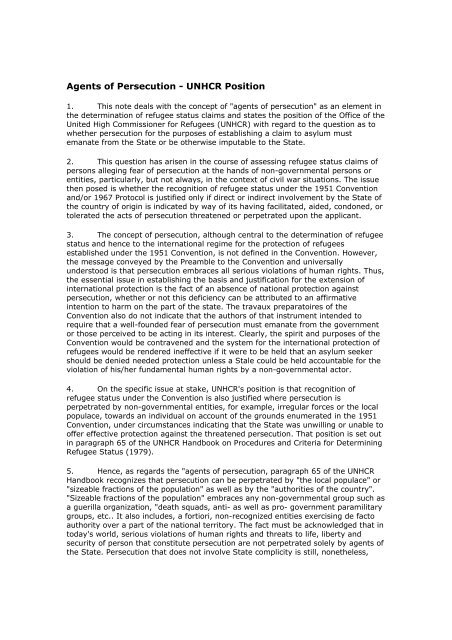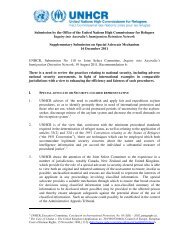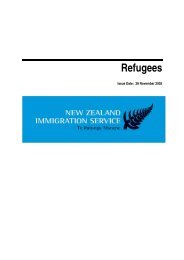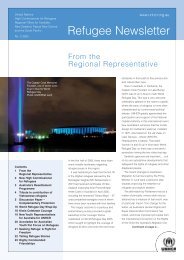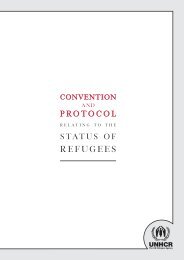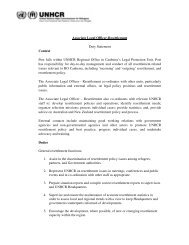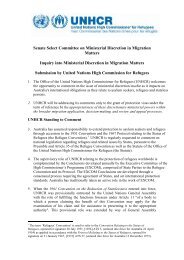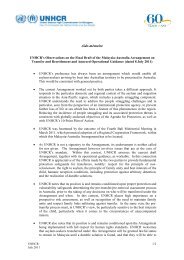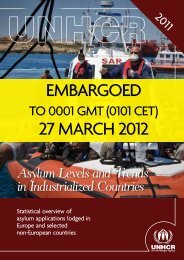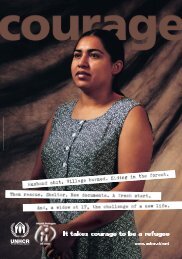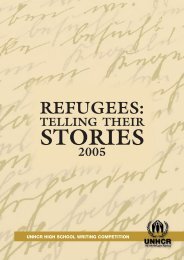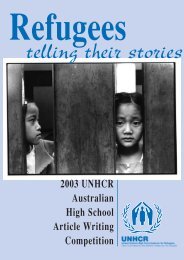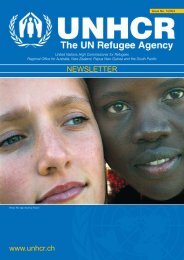Agents of Persecution - UNHCR Position
Agents of Persecution - UNHCR Position
Agents of Persecution - UNHCR Position
You also want an ePaper? Increase the reach of your titles
YUMPU automatically turns print PDFs into web optimized ePapers that Google loves.
<strong>Agents</strong> <strong>of</strong> <strong>Persecution</strong> - <strong>UNHCR</strong> <strong>Position</strong>1. This note deals with the concept <strong>of</strong> "agents <strong>of</strong> persecution" as an element inthe determination <strong>of</strong> refugee status claims and states the position <strong>of</strong> the Office <strong>of</strong> theUnited High Commissioner for Refugees (<strong>UNHCR</strong>) with regard to the question as towhether persecution for the purposes <strong>of</strong> establishing a claim to asylum mustemanate from the State or be otherwise imputable to the State.2. This question has arisen in the course <strong>of</strong> assessing refugee status claims <strong>of</strong>persons alleging fear <strong>of</strong> persecution at the hands <strong>of</strong> non-governmental persons orentities, particularly, but not always, in the context <strong>of</strong> civil war situations. The issuethen posed is whether the recognition <strong>of</strong> refugee status under the 1951 Conventionand/or 1967 Protocol is justified only if direct or indirect involvement by the State <strong>of</strong>the country <strong>of</strong> origin is indicated by way <strong>of</strong> its having facilitated, aided, condoned, ortolerated the acts <strong>of</strong> persecution threatened or perpetrated upon the applicant.3. The concept <strong>of</strong> persecution, although central to the determination <strong>of</strong> refugeestatus and hence to the international regime for the protection <strong>of</strong> refugeesestablished under the 1951 Convention, is not defined in the Convention. However,the message conveyed by the Preamble to the Convention and universallyunderstood is that persecution embraces all serious violations <strong>of</strong> human rights. Thus,the essential issue in establishing the basis and justification for the extension <strong>of</strong>international protection is the fact <strong>of</strong> an absence <strong>of</strong> national protection againstpersecution, whether or not this deficiency can be attributed to an affirmativeintention to harm on the part <strong>of</strong> the state. The travaux preparatoires <strong>of</strong> theConvention also do not indicate that the authors <strong>of</strong> that instrument intended torequire that a well-founded fear <strong>of</strong> persecution must emanate from the governmentor those perceived to be acting in its interest. Clearly, the spirit and purposes <strong>of</strong> theConvention would be contravened and the system for the international protection <strong>of</strong>refugees would be rendered ineffective if it were to be held that an asylum seekershould be denied needed protection unless a Stale could be held accountable for theviolation <strong>of</strong> his/her fundamental human rights by a non-governmental actor.4. On the specific issue at stake, <strong>UNHCR</strong>'s position is that recognition <strong>of</strong>refugee status under the Convention is also justified where persecution isperpetrated by non-governmental entities, for example, irregular forces or the localpopulace, towards an individual on account <strong>of</strong> the grounds enumerated in the 1951Convention, under circumstances indicating that the State was unwilling or unable to<strong>of</strong>fer effective protection against the threatened persecution. That position is set outin paragraph 65 <strong>of</strong> the <strong>UNHCR</strong> Handbook on Procedures and Criteria for DeterminingRefugee Status (1979).5. Hence, as regards the "agents <strong>of</strong> persecution, paragraph 65 <strong>of</strong> the <strong>UNHCR</strong>Handbook recognizes that persecution can be perpetrated by "the local populace" or"sizeable fractions <strong>of</strong> the population" as well as by the "authorities <strong>of</strong> the country"."Sizeable fractions <strong>of</strong> the population" embraces any non-governmental group such asa guerilla organization, "death squads, anti- as well as pro- government paramilitarygroups, etc.. It also includes, a fortiori, non-recognized entities exercising de factoauthority over a part <strong>of</strong> the national territory. The fact must be acknowledged that intoday's world, serious violations <strong>of</strong> human rights and threats to life, liberty andsecurity <strong>of</strong> person that constitute persecution are not perpetrated solely by agents <strong>of</strong>the State. <strong>Persecution</strong> that does not involve State complicity is still, nonetheless,
persecution. Non-governmental groups have persecuted individuals for reasons <strong>of</strong>race, religion, nationality, membership <strong>of</strong> a particular social group or politicalopinion. Under these circumstances, where their own State <strong>of</strong> origin proves unable toprotect them, victims or potential victims <strong>of</strong> such forms <strong>of</strong> persecution are, equally,the intended beneficiaries <strong>of</strong> the 1951 Convention and 1967 Protocol relating to theStatus <strong>of</strong> Refugees.6. In the case <strong>of</strong> persecution that does not emanate from the State, it has to beevidenced that the State was either unwilling or unable to provide protection. Incertain political contexts, e.g., where the situation is characterized by civil war,anarchy or breakdown <strong>of</strong> law and order in the whole or parts <strong>of</strong> the territory, theconstituted State authority may have hardly any control over the agents <strong>of</strong>persecution. The need for protection that individuals may require against the seriousviolation <strong>of</strong> their human rights in such a context is, nonetheless, consistent with theterms <strong>of</strong> the 1951 Convention.7. Moreover, the fact that several individuals in those situations share the samerisks or persecution on account <strong>of</strong> their nationality, race, religion, membership <strong>of</strong> aparticular social group or political opinion does not make the threat <strong>of</strong> persecutionless relevant nor does it exclude the applicability <strong>of</strong> obligations under the 1951Convention, towards those individuals concerned, on the part <strong>of</strong> the States petitionedfor asylum.8. In the particular context <strong>of</strong> civil war, <strong>UNHCR</strong> agrees with the position thatasylum seekers whose reasons for flight are based solely on their area <strong>of</strong> residencebeing stricken by war are not covered by the 1951 Convention. It is appreciated,however, that many conflicts take place against a political background which mayinvolve serious violations <strong>of</strong> human rights, including the targeting <strong>of</strong> particular ethnicor religious groups perceived as not sharing the political interests <strong>of</strong> theirprotagonists. In addition, as highlighted at the recent International Conference forthe Protection <strong>of</strong> War Victims, increasingly, the conduct <strong>of</strong> war involves human rightsviolations which may amount to persecution within the terms <strong>of</strong> the 1951Convention, when the elements <strong>of</strong> the refugee definition are involved. Personsfleeing situations <strong>of</strong> conflict may therefore qualify as 1951 Convention refugees,depending on the particular circumstances. The determination <strong>of</strong> refugee status willrequire a careful examination <strong>of</strong> the specific circumstances surrounding theapplicant's claim, including an assessment <strong>of</strong> the nature <strong>of</strong> the conflict.9. Finally, <strong>UNHCR</strong> wishes to point out that the principle outlined above reflectsthe approach taken by the great majority <strong>of</strong> States parties on the issue <strong>of</strong> agents <strong>of</strong>persecution. <strong>UNHCR</strong>'s close involvement in the refugee status determinationprocedures <strong>of</strong> States parties around the world has provided it with the opportunity toobserve the standard practice, in this regard, <strong>of</strong> the respective national bodiescharged with refugee status eligibility determination. Significantly, the Handbook' sapproach is reflected in international jurisprudence, having been replicated in anumber <strong>of</strong> important decisions from various jurisdictions, including Australia,Canada. France, United States and New Zealand. <strong>UNHCR</strong> would be happy to sharedetails <strong>of</strong> these decisions.<strong>UNHCR</strong>, Geneva, 1995


